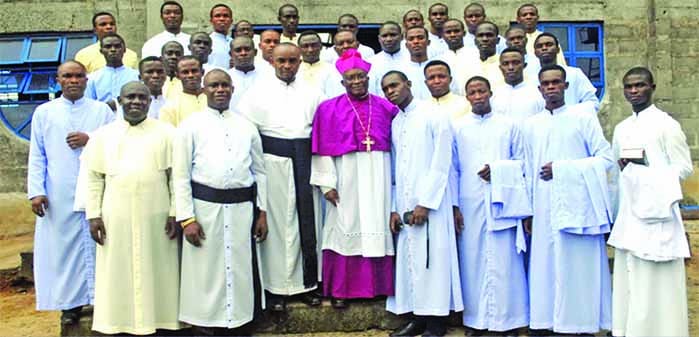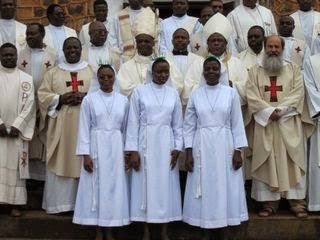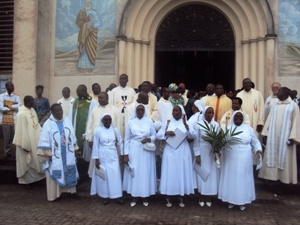Last night, I came across the following statement on the platform of the National Union of Ghana Catholic Diocesan Priests’ Associations (NUGCDPA): “In years past, many of us thought the title Rev. is reserved to the ordained. It is now evidently clear that it was a mistake. Yes, nuns qualify to be addressed as Reverend”. The issue of whether religious Sisters and Brothers should be addressed with the title “Reverend” has been discussed for a long time in Ghana. Some years ago, I dealt with this question on my platform, AskBishopBonsu. I would like to revisit the question in the light of the statement quoted above.
The term reverend is the English rendering of the Latin reverendus/reverenda which means “one who is to be revered” or “one who must be respected”. The term “reverend” does not etymologically suggest or imply that the person to whom it refers has been ordained a priest. It refers to one who must be revered or shown respect by virtue of his or her office. The person thus addressed need not be ordained.
However, in terms of usage, we must note that the term reverendus/ reveranda was originally used by the Church to designate clerics and/or those in consecrated vows. In speech, the Irish, for example, were likely to talk of “his/her Reverence”. It was simply a designation of “consecration”, neither honorific nor separatist in intention, but descriptive like “doctor” or “nurse” or “advocate” – and in that sense, it was “respectful”. About sixty years ago, nuns were always addressed, not least on paper, as “Reverend Sister/Mother”. Religious Brothers were also addressed as Reverend, and a priest as “The Reverend Jones”, although addressed verbally as “Father Jones”. Religious priests, however, were always addressed on paper as “Father Peter Smith, OFM”, etc.

Apart from what was customarily done, does the Church have any official directives on this matter? In answering this question, I consulted Cardinal Arthur Roche, the Prefect of the Dicastery for Divine Worship and the Discipline of the Sacraments in Rome. He mentioned that on 31 March 1969, Pope Paul VI issued an Instruction called Ut sive sollicite. Among other things, this Instruction addressed the matter of titles to be used for the Pope, Cardinals, Bishops and lesser prelates (including Chaplains of his Holiness or Monsignors). At the end of the Instruction, it was stated that the Sacred Congregation for the Clergy was going to produce a document dealing, among other things, with the titles of Canons, Beneficiaries and Pastors: “Finally, concerning the dress and titles of Canons, Beneficiaries, and Pastors, suitable prescriptions will be laid down for the future by the Sacred Congregation for the Clergy that are in keeping with the reasons for this Instruction, namely that in this matter also all things may be reduced to a simpler form” (par. 35). Unfortunately, such a document has not been produced since Pope Paul VI spoke some fifty years ago in March 1969!
Basing himself on contemporary usage and noting that the supposed document envisaged by Pope Paul VI has not come out and that there is nothing in the Code of Canon Law on this subject, Cardinal Arthur Roche said: “Therefore, taking my line of reasoning from the above-mentioned document (Ut sive sollicite), I would say that for Religious Sisters and Brothers, the prefix Reverend is now archaic”. He added, “However, as Consecrated Religious, this should be recognised and retained simply in the title Sister and Brother. As for Major Superiors then, the law on custom seems to me to fit and their own particular law, a minefield if there ever was one, should be referred to”.
In like manner, I also consulted Rev. Keith F. Pecklers, S.J., Professor of Liturgy, Pontifical Gregorian University and Professor of Liturgical History, Pontifical Liturgical Institute, Rome, who said, “The only place I have ever encountered the title ‘Reverend Sister’ is in Africa. I am not sure how it began there but I have not seen it used in Italy or elsewhere. In Italy the title is normally ‘Suor Maria’ (i.e. Sister Maria). In speaking to her directly one would either address her as ‘Suor Maria’ or ‘Sorella’ (i.e. Sister) but no mention of ‘Reverenda’”.
In the light of the foregoing discussion, especially the contemporary usage of the term “Reverend”, it will be better not to address Religious Sisters and Brothers with the title “Reverend”. The term “Reverend” is now used only of ordained ministers, i.e. deacons, priests, bishops, archbishops, etc. Thus, in addressing Religious Sisters and Brothers, the correct address will be, for example, Sister Margaret and Brother Thomas and not Rev. Sister Margaret and Rev. Brother Thomas. In the case of Major Superiors, as we have seen above, the recommendation is that they follow their own particular law or tradition.
In conclusion, since this issue concerns the Religious, or Consecrated Men and Women, the matter should be taken up by the Conference of Major Superiors of Religious, Ghana. This body is made up of both men and women leaders of the Catholic Religious Congregations in Ghana. It was established on 23 August 2013 when Rome recognized the group as a body in the church in Ghana. The aim of this Conference, composed of about seventy members of both religious men and women, is to promote deeper collaboration between the leaders of the congregations in Ghana. I am sure that this Conference can handle this issue competently, especially with the assistance of those Bishops in Ghana who are Religious.
By: Most Rev. Joseph Osei-Bonsu
Emeritus Bishop of Konongo-Mampong












